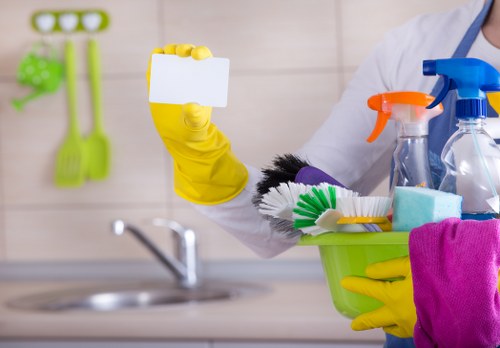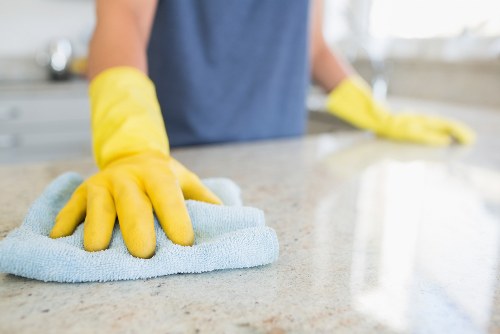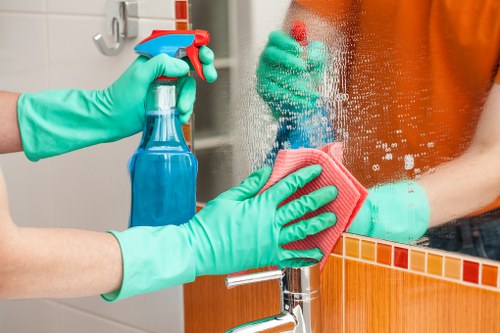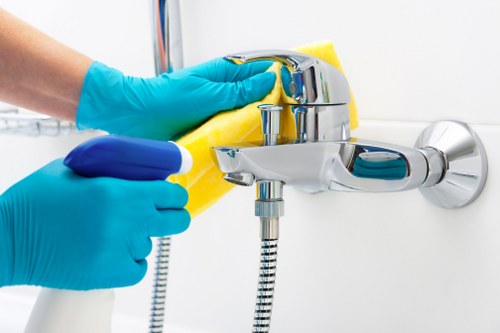Comprehensive Guide to Oven Cleaning in Kensington

Keeping your oven clean is essential not only for maintaining its efficiency but also for ensuring the health and safety of your household. In Kensington, finding the right oven cleaning services can make a significant difference in the longevity of your appliance and the quality of your cooking.
Oven cleaning can seem like a daunting task, especially if you've never tackled it before. However, with the right guidance and professional help, you can achieve a spotless and well-maintained oven without much hassle.
In this article, we'll explore the best practices for oven cleaning in Kensington, highlight the benefits of professional services, and provide tips to keep your oven in top condition.
Why Regular Oven Cleaning is Important

Regular oven cleaning is crucial for several reasons. Firstly, a clean oven operates more efficiently, reducing energy consumption and lowering your utility bills. Grease and food residue can create hotspots, leading to uneven cooking and longer cooking times.
Secondly, a dirty oven can pose health risks. Accumulated grime and bacteria can contaminate your food, potentially leading to foodborne illnesses. Regular cleaning ensures that your oven is hygienic and safe to use.
Lastly, maintaining a clean oven can extend its lifespan. Preventing the buildup of corrosive substances like spills and splatters can protect the internal components, minimizing the need for costly repairs or replacements.
DIY Oven Cleaning vs. Professional Services

When it comes to oven cleaning, homeowners often debate between DIY methods and hiring professional services. Both approaches have their pros and cons, and understanding them can help you make an informed decision.
DIY Cleaning: Cleaning your oven yourself can be cost-effective, especially if you have the right tools and cleaners on hand. Common DIY methods include using baking soda and vinegar or commercial oven cleaners. These methods can effectively remove surface grime but may require significant effort for deep cleaning.
Professional Services: Hiring a professional oven cleaning service in Kensington offers several advantages. Professionals have access to specialized tools and high-grade cleaning agents that can tackle tough, baked-on stains more effectively. Additionally, professional cleaners can save you time and ensure that your oven is cleaned thoroughly without the risk of damaging sensitive components.
Top Oven Cleaning Services in Kensington

Kensington boasts a variety of reputable oven cleaning services that cater to different needs and budgets. Here are some of the top providers in the area:
- Kensington CleanPro: Known for their thorough cleaning techniques and exceptional customer service, CleanPro is a top choice for many residents.
- Sparkle Oven Services: Sparkle offers both interior and exterior oven cleaning, using eco-friendly products to ensure a safe environment.
- Elite Kitchen Care: Specializing in high-end appliances, Elite Kitchen Care is ideal for those with luxury ovens requiring delicate handling.
- QuickClean Services: If you're short on time, QuickClean provides fast and efficient oven cleaning without compromising on quality.
- Green Oven Solutions: Emphasizing sustainability, Green Oven Solutions uses biodegradable cleaners and practices environmentally friendly methods.
Steps to Maintain a Clean Oven

Maintaining a clean oven doesn't have to be a monthly chore. Incorporating simple habits into your routine can help keep your oven in pristine condition for longer periods. Here are some effective maintenance tips:
- Regular Wipe-Downs: After each use, wipe down any spills or splatters to prevent them from hardening over time.
- Use Oven Liners: Place oven liners or baking mats on the bottom rack to catch drips and crumbs, making cleanup easier.
- Avoid Overcrowding: Ensure proper airflow inside the oven by not overcrowding it with too many dishes, which can lead to uneven cooking and more mess.
- Ventilation: Use the oven's ventilation system to reduce the accumulation of grease and vapor, minimizing the chances of residue buildup.
- Schedule Professional Cleanings: Even with regular maintenance, scheduling professional cleanings periodically ensures a deep cleanse that DIY methods might miss.
Eco-Friendly Oven Cleaning Options
As more people become environmentally conscious, eco-friendly oven cleaning methods have gained popularity. These methods reduce harmful chemical usage and are safer for both your family and the environment.
One popular eco-friendly method involves a mixture of baking soda and vinegar. Baking soda acts as a mild abrasive to scrub away grime, while vinegar helps dissolve grease and eliminates odors. This combination is effective for routine cleaning and doesn't leave behind toxic residues.
Another option is using natural citrus-based cleaners. These cleaners not only smell pleasant but also have degreasing properties that make cleaning easier. Additionally, many professional services in Kensington now offer green cleaning options, ensuring that your oven is clean without compromising on environmental values.
Choosing the Right Oven Cleaner
Selecting the right oven cleaner is crucial for achieving the best results without damaging your appliance. Whether you opt for a DIY approach or hire a professional service, consider the following factors:
- Compatibility: Ensure that the cleaner you choose is suitable for your oven type, whether it's gas, electric, or self-cleaning.
- Safety: Look for non-toxic and environmentally friendly cleaners, especially if you have young children or pets at home.
- Effectiveness: Choose a cleaner that effectively removes grease, grime, and baked-on residue without requiring excessive scrubbing.
- Ease of Use: For DIY methods, opt for cleaners that are easy to apply and rinse off, saving you time and effort.
For those who prefer professional help, inquire about the types of cleaners they use and whether they offer green cleaning options to align with your preferences.
Common Oven Cleaning Mistakes to Avoid
Cleaning your oven might seem straightforward, but several common mistakes can hinder the process or even damage your appliance. Avoid these pitfalls to ensure effective and safe cleaning:
- Using Abrasive Tools: Steel wool or harsh scouring pads can scratch and damage the oven's interior. Instead, use non-abrasive sponges or cloths.
- Ignoring Manufacturer Instructions: Always refer to your oven's user manual for specific cleaning guidelines to prevent voiding warranties or causing damage.
- Overusing Cleaners: Excessive use of chemical cleaners can leave harmful residues and may damage the oven's surfaces. Follow the recommended amounts.
- Neglecting Safety Precautions: Always ensure the oven is turned off and cooled down before cleaning. Use gloves and ensure proper ventilation when using chemical cleaners.
- Not Cleaning Regularly: Allowing grime to build up over time makes cleaning more challenging and less effective. Regular maintenance is key.
Benefits of Hiring Local Kensington Oven Cleaning Services
Choosing a local Kensington oven cleaning service offers numerous benefits. Local businesses are more likely to have a strong reputation in the community, ensuring reliable and trustworthy service. Additionally, they understand the specific needs and preferences of Kensington residents, providing customized cleaning solutions.
Moreover, local services often offer prompt response times and flexible scheduling, accommodating your busy lifestyle. Supporting local businesses also contributes to the local economy, fostering a sense of community and mutual support.
When selecting a local oven cleaning service, consider factors such as customer reviews, experience, and the range of services offered to ensure you receive the best possible care for your oven.
Cost of Oven Cleaning in Kensington
The cost of oven cleaning in Kensington can vary based on several factors, including the size of the oven, the level of dirt and grime, and whether you choose a DIY approach or professional service.
DIY Cleaning: The cost is generally lower, involving the purchase of cleaning supplies such as baking soda, vinegar, or commercial cleaners. This can range from $10 to $30, depending on the products used.
Professional Services: Hiring a professional oven cleaner typically costs between $100 and $300. The price may increase for larger or heavily soiled ovens, or if additional services like deep cleaning or sanitizing are required.
While professional services are more expensive upfront, they offer convenience, thoroughness, and expertise that can save you time and ensure your oven is cleaned effectively.
Preparing Your Oven for Cleaning
Proper preparation is essential for an effective oven cleaning process. Whether you're cleaning it yourself or scheduling a professional service, follow these steps to get your oven ready:
- Remove Oven Racks and Accessories: Take out all removable parts such as racks, trays, and knobs. Soak them in warm, soapy water to loosen any stuck-on food.
- Turn Off and Cool Down: Ensure the oven is turned off and completely cooled to prevent burns and ensure safe handling.
- Clear the Area: Remove any flammable items or clutter around the oven to create a safe and accessible workspace for cleaning.
- Cover Sensitive Parts: Protect electrical components and control panels from cleaning agents by covering them with tape or plastic sheets.
- Ventilate the Space: Open windows or turn on fans to provide adequate ventilation, especially if using chemical cleaners that emit strong fumes.
After-Cleaning Tips for a Spotless Oven
Once your oven is clean, follow these tips to maintain its spotless condition:
- Regular Wiping: After each use, quickly wipe down any spills to prevent them from hardening.
- Use Splatter Guards: These can help catch drips and spills, making cleanup easier.
- Schedule Routine Deep Cleans: Even with regular maintenance, schedule a deep clean every few months to address hidden grime.
- Avoid Overcrowding Dishes: Proper spacing allows for even cooking and reduces the likelihood of spills.
- Monitor Cooking Times: Avoid overcooking, which can lead to more residue and buildup inside the oven.
Local Regulations and Safety Standards
When hiring a professional oven cleaning service in Kensington, it's essential to ensure they comply with local regulations and safety standards. Licensed and insured services adhere to specific guidelines that guarantee safe and effective cleaning practices.
Additionally, understanding the environmental regulations in Kensington can help you choose services that prioritize eco-friendly methods, reducing the impact on the environment while maintaining cleanliness.
Always ask for proof of licensing and insurance, and inquire about the cleaning products and methods they use to ensure they align with your standards and preferences.
Customer Reviews and Testimonials
Before selecting an oven cleaning service in Kensington, consider reading customer reviews and testimonials. Feedback from previous clients provides valuable insights into the quality, reliability, and professionalism of the service provider.
Look for reviews that mention the effectiveness of the cleaning, the punctuality of the service, and the friendliness of the staff. Positive testimonials can give you confidence in your choice, while negative reviews may highlight potential issues to watch out for.
Additionally, asking for references or checking ratings on reputable platforms can further inform your decision, ensuring you select a service that meets your expectations.
Scheduling Your Oven Cleaning
Scheduling oven cleaning in Kensington requires some planning to ensure it fits seamlessly into your routine. Here are some tips for scheduling effectively:
- Plan Ahead: Avoid last-minute bookings by scheduling your oven cleaning well in advance, especially during peak seasons.
- Choose Convenient Times: Select a time that causes minimal disruption to your daily activities, such as weekends or evenings.
- Confirm Appointments: Double-check your appointment details and confirm with the service provider to prevent any misunderstandings.
- Prepare Your Home: Ensure your oven is accessible and all necessary preparations are made before the scheduled cleaning.
- Set Reminders: Use calendars or reminders to keep track of your cleaning appointments, ensuring you don't forget or miss them.
By planning ahead and coordinating with your chosen service provider, you can ensure a smooth and efficient oven cleaning experience.
Tools and Equipment Used in Professional Oven Cleaning
Professional oven cleaners utilize a range of specialized tools and equipment to achieve a thorough and efficient clean. Understanding these tools can help you appreciate the level of expertise involved in professional services:
- High-Pressure Steam Cleaners: These devices use steam to loosen and remove stubborn grime without the need for harsh chemicals.
- Commercial-Grade Scrubbers: Heavy-duty scrubbers effectively eliminate baked-on residue, making the cleaning process faster and more effective.
- Specialized Cleaning Agents: Professionals use high-strength, often eco-friendly cleaning agents designed to tackle tough stains while being safe for your oven.
- Protective Gear: Gloves, masks, and protective eyewear ensure the safety of the cleaning staff, especially when handling potent chemicals.
- Inspection Tools: After cleaning, professionals use tools to inspect and ensure that no residue remains and that all components are functioning correctly.
These tools and equipment enable professionals to deliver a level of cleanliness that is often challenging to achieve with standard household cleaning methods.
Understanding Different Oven Types
Different ovens require different cleaning approaches based on their design and functionality. Understanding your oven type can help you choose the most appropriate cleaning method:
- Conventional Ovens: These ovens use heating elements at the top and bottom. Cleaning involves removing grime from both elements and the interior surfaces.
- Self-Cleaning Ovens: Equipped with a pyrolytic cycle, these ovens can reach high temperatures to burn off residues. While convenient, they still benefit from periodic manual cleaning for optimal performance.
- Steam Ovens: Using steam for cooking, these ovens require gentle cleaning techniques to avoid damaging the steam-producing components.
- Microwave Ovens: Although not typically categorized under traditional ovens, microwave ovens also require regular cleaning to prevent food buildup and maintain functionality.
- Dual Ovens: Combining two separate oven compartments, dual ovens demand thorough cleaning of each section to ensure both operate efficiently.
Identifying your oven type helps in selecting the right cleaning methods and products, ensuring that your appliance remains in excellent working condition.
Benefits of a Clean Oven for Cooking
A clean oven not only enhances the appliance's performance but also improves the overall cooking experience. Here are some benefits:
- Even Heat Distribution: A clean oven ensures that heat is distributed evenly, preventing hotspots and ensuring consistent cooking results.
- Improved Flavor: Residues and burnt food can impart unpleasant flavors to your dishes. A spotless oven maintains the pure taste of your food.
- Energy Efficiency: Removing grease and grime allows the oven to operate more efficiently, reducing energy consumption and lowering utility bills.
- Extended Appliance Lifespan: Regular cleaning prevents corrosion and damage to internal components, prolonging the life of your oven.
- Enhanced Aesthetics: A clean oven looks more appealing and adds to the overall cleanliness of your kitchen.
Choosing Between Gas and Electric Ovens for Cleaning
Gas and electric ovens have different cleaning requirements due to their distinct heating mechanisms. Understanding these differences can help you choose the most effective cleaning approach:
- Gas Ovens: These ovens require careful cleaning around the gas burners to prevent clogging and ensure proper functionality. Avoid using excessive moisture, which can interfere with the gas supply.
- Electric Ovens: Electric ovens often have higher temperature settings, making it easier to burn off residues during self-cleaning cycles. However, direct cleaning agents should be used carefully to avoid damaging the heating elements.
Regardless of the oven type, always refer to the manufacturer's guidelines to ensure safe and effective cleaning practices.
Safety Tips for Oven Cleaning
Cleaning your oven safely is paramount to prevent accidents and damage. Here are essential safety tips to follow:
- Turn Off the Oven: Ensure the oven is turned off and completely cooled before starting the cleaning process to avoid burns.
- Use Protective Gear: Wear gloves to protect your hands from harsh chemicals and hot surfaces. Eye protection is also recommended when using strong cleaners.
- Proper Ventilation: Open windows or use fans to ventilate the area, especially when using chemical cleaners that emit fumes.
- Follow Instructions: Always read and follow the instructions on cleaning products to prevent misuse and accidental damage.
- Avoid Mixing Cleaners: Do not mix different cleaning agents, as this can create toxic fumes or reduce their effectiveness.
- Secure Cords and Cleaners: Keep cleaning tools and chemical cleaners away from children and pets to prevent accidental ingestion or exposure.
Adhering to these safety tips ensures a safe and effective oven cleaning process.
Innovations in Oven Cleaning Technology
The field of oven cleaning has seen significant advancements, making the process more efficient and environmentally friendly. Here are some of the latest innovations:
- Self-Cleaning Enhancements: Modern self-cleaning ovens feature improved pyrolytic cycles that reduce cleaning time and energy consumption.
- Smart Cleaning Systems: Integrating smart technology, some ovens now offer automated cleaning schedules and alerts, ensuring regular maintenance without manual intervention.
- Eco-Friendly Cleaners: The development of biodegradable and non-toxic cleaning agents provides effective cleaning solutions that are safe for both users and the environment.
- Steam Cleaning Features: Steam cleaning capabilities offer a chemical-free alternative, using high-pressure steam to remove residues effectively.
- Advanced Scrubbing Tools: New scrubbing tools and accessories are designed to reach intricate parts of the oven, ensuring a comprehensive clean.
These innovations continue to enhance the oven cleaning experience, making it easier, safer, and more sustainable for homeowners.
Local Kensington Regulations for Cleaning Services
Kensington has specific regulations and standards that local cleaning services must adhere to. These regulations ensure that services operate safely, ethically, and in compliance with environmental guidelines.
When choosing a cleaning service, verify that they are licensed and certified to operate in Kensington. This compliance guarantees that the service meets local safety and quality standards, providing peace of mind and reliable results.
Additionally, some areas within Kensington may have specific requirements regarding waste disposal and the use of eco-friendly products. Ensure that your chosen service is aware of and adheres to these local regulations to support a clean and sustainable community.
Emergency Oven Cleaning Services
Occasionally, ovens may require immediate cleaning due to unforeseen spills, accidents, or urgent cooking needs. Kensington offers emergency oven cleaning services that cater to such situations, providing prompt and efficient solutions.
These services are designed to respond quickly, often within the same day, to address urgent cleaning needs. They prioritize thoroughness and safety, ensuring that your oven is restored to a clean and functional state as soon as possible.
When opting for emergency services, consider factors such as availability, response time, and the ability to handle urgent requests, ensuring you receive timely and effective assistance when needed.
Seasonal Oven Cleaning Tips
Different seasons can impact how frequently and thoroughly you need to clean your oven. Here are some seasonal tips to maintain your oven year-round:
- Spring: After the winter months, conduct a deep clean to remove accumulated grime and prepare your oven for the warmer cooking seasons.
- Summer: With more outdoor cooking, regularly wipe down your oven to prevent spills from outdoor grilling from hardening inside.
- Autumn: Prepare your oven for holiday baking by ensuring it's clean and functioning efficiently, preventing last-minute issues.
- Winter: Utilize self-cleaning cycles more frequently, as home cooking increases during colder months.
Adapting your oven cleaning routine to the seasons ensures optimal performance and helps address specific cleaning challenges associated with each time of year.
Conclusion
Maintaining a clean oven is a vital aspect of home upkeep that enhances cooking efficiency, ensures food safety, and prolongs the appliance's lifespan. In Kensington, a variety of professional oven cleaning services cater to diverse needs, offering both traditional and eco-friendly cleaning solutions.
Whether you choose to handle the cleaning yourself or enlist professional help, understanding the importance of regular maintenance, selecting the right cleaning methods, and adhering to safety standards are key to achieving a spotless and efficient oven.
By following the tips and guidelines outlined in this article, you can ensure that your oven remains in excellent condition, providing reliable performance and contributing to a healthy and pleasant kitchen environment.
Frequently Asked Questions

1. How often should I clean my oven?
It's recommended to clean your oven at least once every three months. However, more frequent cleaning may be necessary if you use your oven regularly or notice significant buildup.
2. Can I use baking soda and vinegar to clean my oven?
Yes, a mixture of baking soda and vinegar is an effective and eco-friendly method for cleaning the oven's interior. Baking soda helps scrub away grime, while vinegar dissolves grease and eliminates odors.
3. Are professional oven cleaning services safe for all oven types?
Reputable professional cleaning services in Kensington are trained to handle various oven types, including gas, electric, and self-cleaning models. Always inform the service provider about your specific oven type to ensure appropriate cleaning methods are used.
4. What should I do if my oven has stubborn baked-on stains?
For stubborn stains, using a stronger cleaning agent or opting for a professional cleaning service may be necessary. Professionals have access to specialized tools and cleaners that can effectively remove tough residues without damaging your oven.
5. How can I prevent my oven from getting dirty in the first place?
Preventing oven grime involves regular maintenance, such as wiping down spills immediately, using oven liners, avoiding overfilling dishes, and ensuring proper ventilation during cooking to reduce grease buildup.


